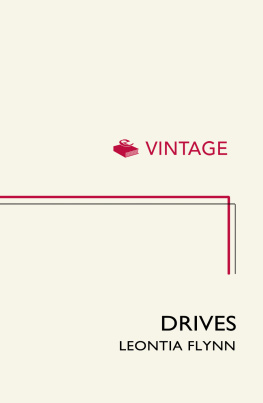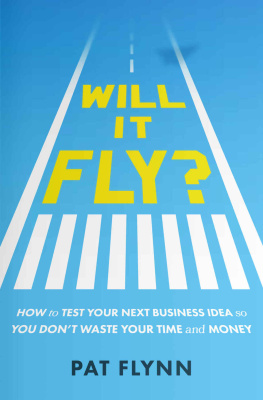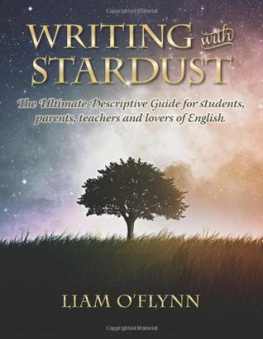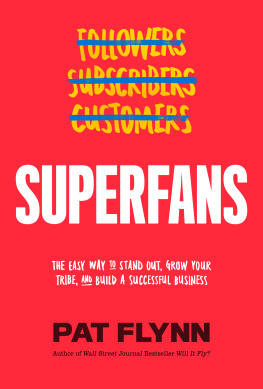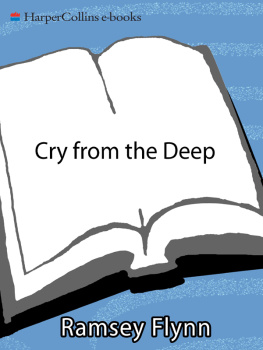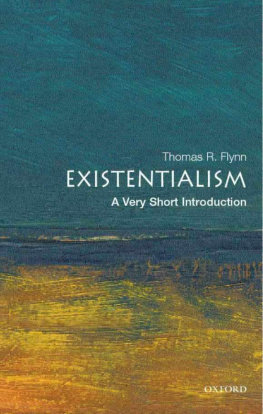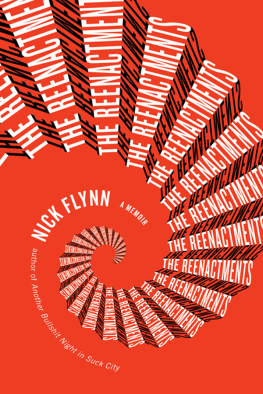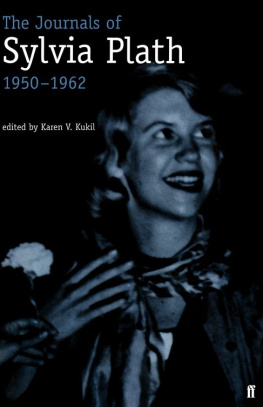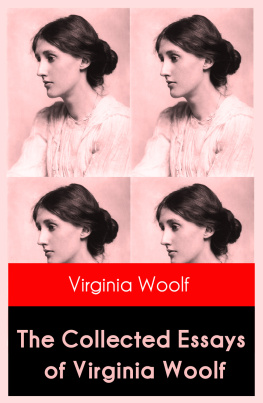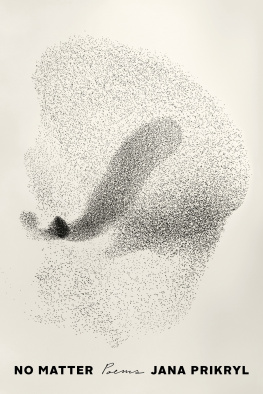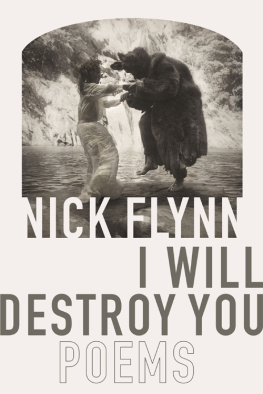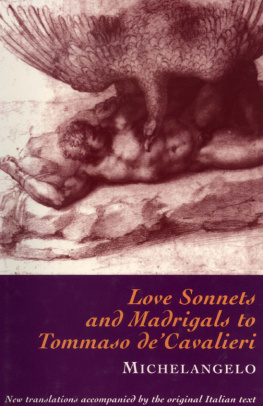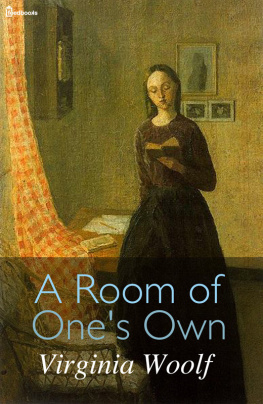CONTENTS Oh, tourist, is this how this country is going to answer youand your immodest demands for a different world, and a better life, and complete comprehensionof both at last... Arrival at Santos, Elizabeth Bishop Freud had an interesting theory, the Oedipal theory.You know that all men, he said, want to sleep withtheir moms. I thought that was bullshit, until one dayI saw a picture of Freuds mom... Bill Hicks
ABOUT THE BOOK
Following on from the assured day-to-day poems ofher first collection, Leontia Flynns second,
Drives, is a book of restless journeys real and imaginary interspersed with a series of sonnets on writers.Beginning in Belfast, where she lives, she visits adisjointed number of cities in Europe and the States each one the occasion for an elliptical postcardhome to herself. Alongside these reports from abroad, portraits ofdead writers flicker through the pages of this book Baudelaire, Proust and Beckett; Bishop, Plath andVirginia Woolf all revealing aspects of themselves,their frailties and their sicknesses, but also, wesuspect, aspects of their ventriloquising author. What these poems share is a furious refusal ofreceived opinion, of a language recycled andredundant; they are raw, exposed and angrily awareof distance the distance between what one needsand what one receives, between love and what islost. In particular, the lives here are haunted by thelost idyll of childhood, while poems about thepoets own mother and ageing father bring thecollection to a close.With an alert ear for fractureand disarray and a tender eye for damage,
Drives isa passionate enquiry into what shapes us asindividuals.
ABOUT THE AUTHOR
Leontia Flynn was born in 1974 and lives in Belfast.
Her first book, These Days, won the Forward Prize for Best First Collection. She is currently a post-doctoral research fellow at the Seamus Heaney Centre for Poetry at Queens University.
ACKNOWLEDGEMENTS
Acknowledgements are due to the editors of the following:
Agni, An Sionnach, Blue Nose, Edinburgh Review, Magnetic North: the Emerging Poets, New Welsh Review, Poetry Ireland, Poetry London, The Times Literary Supplement, The Ulster Tatler, The Yellow Nib The author is grateful to the Arts Council of Northern Ireland for an award under the Support for Individual Artists Programme 2004, the Ireland Fund and the Princess Grace Irish Library in Monaco. Robert Lowell incorporates a phrase from his poem Skunk Hour. Dorothy Parker begins with the line with which her poem Resum ends and F. Scott Fitzgerald begins with the opening line of his essay The Crack Up.
Belfast contains a line from Belfast by Louis MacNeice. Elsewhere borrowings by other writers are indicated or paraphrased. for my parents
Drives
Leontia Flynn

ALSO BY LEONTIA FLYNN
These Days This ebook is copyright material and must not be copied, reproduced, transferred, distributed, leased, licensed or publicly performed or used in any way except as specifically permitted in writing by the publishers, as allowed under the terms and conditions under which it was purchased or as strictly permitted by applicable copyright law. Any unauthorised distribution or use of this text may be a direct infringement of the authors and publishers rights and those responsible may be liable in law accordingly. Epub ISBN: 9781407014562 Version 1.0 www.randomhouse.co.uk Published by Jonathan Cape 2008 2 4 6 8 10 9 7 5 3 1 Copyright Leontia Flynn 2008 Leontia Flynn has asserted her right under the Copyright, Designs and Patents Act 1988 to be identified as the author of this work First published in Great Britain in 2008 by Jonathan Cape Random House, 20 Vauxhall Bridge Road, London SW1V 2SA www.randomhouse.co.uk Addresses for companies within the Random House Group Limited can be found at: www.randomhouse.co.uk/offices.htm The Random House Group Limited Reg. 954009 A CIP catalogue record for this book is available from the British Library ISBN 9780224085175
SONG
In the silver-grey dark of your room your hands are still nothing is moving the blinds are drawn but over and over the stars rush forward on your screen-saver.
BELFAST
The sky is a washed-out theatre backcloth behind new faades on old baths and gasworks; downtown, under the green sails of their scaffolding, a dozen buildings tops steer over the skyline.
BELFAST
The sky is a washed-out theatre backcloth behind new faades on old baths and gasworks; downtown, under the green sails of their scaffolding, a dozen buildings tops steer over the skyline.
Belfast is finished and Belfast is under construction. What was mixed grills and whiskeys (cultureless, graceless, leisureless) is now concerts and walking tours (Friendly! Dynamic! Various!). A tourist pamphlet contains an artists impression of arcades, mock-colonnades, church-spires and tapas bars; are these harsh attempts at buyable beauty? There are 27 McDonalds, you tell me, in Northern Ireland (but what are we supposed to do with this information?). A match at Windsor Park has fallen in Gay Pride week. At two a.m. the street erupts in noise.
I listen as We are the Billy Boys gets mixed up, four doors down, with Crazy by Patsy Cline. And gathering in the citys handful of bars, not sunk in darkness or swathed in beige leatherette men are talking of Walter Benjamin, and about Grand Narratives which they always seek to fracture and interrogate.
DHILLON SEES THE OCEAN: THE ODYSSEY
Dhillon is travelling by freight train from Minnesota. Leukaemia stirs in the small bones of his body a flurry of poisoned cells, like salt sneaked into tea as he sits among loose straw by the yawning doorway and prairie after prairie scrolls past the wagon. Laura and Albert Ingalls have joined Dhillon on his odyssey. Mr Ingalls intercepts them, but elects not to prevent Dhillon travelling by freight train to San Franscisco.
Night times are worst rough characters from the sidings. The children eat baked beans, cold, straight from the can. As Dhillon arrives in the city, the city is holding its breath. The traffic seems poised on the pavements, the daytime tensed as a web for the last, magic touch of the story when Dhillon, journey over, sees the ocean and it is everything he hoped that it would be.
COUNTRY SONGS
Of all the emailed jokes and online detritus that ebbed and flowed, in the autumn, between our desktops the best, we agreed, were the parodied country songs titles like How can I miss you if you wont go away? or If you wont leave me alone, Ill find someone else who will... They come back to me now, in these small white days of summer and the joke is less funny, the audience reduced; the theatre sits in silence my phoney, lonely-heart soundtrack: When you leave, walk out backward so Ill think youre coming in.
If the phone doesnt ring, baby youll know its me...
PASTORAL
Noting again the CDs stacked alphabetically, the shelves distressed artfully, the hardwood boards which have off-set the bright white colour scheme precisely the mild Kildare air, through the smart glass, begins to infect my moods. For this is my leisured weekend in the country! My father squints at an atlas in search of Kentucky and whistles the opening bars of Memory or Roddy McCorely into his Fairtrade coffee, absent-mindedly while presently, in the living and dining space, on the settee, we discuss fertility! We exchange recipes! And if we should stray to the subject of prices of property we do this, strictly, in the spirit of self-parody, or very quietly. Time passes slowly, calmly the lights come up on this calm Sunday.
Next page
